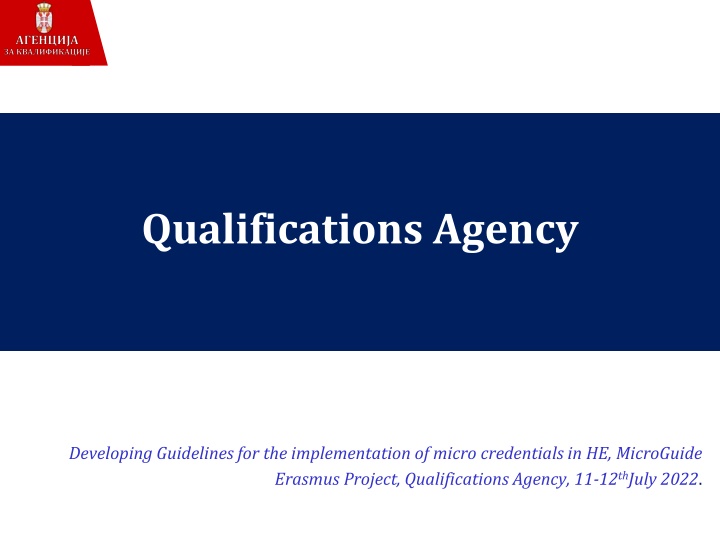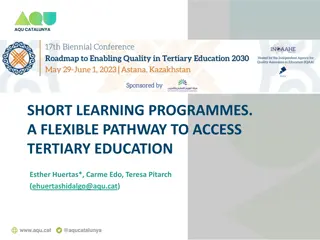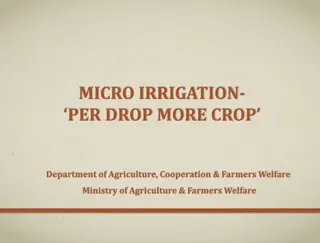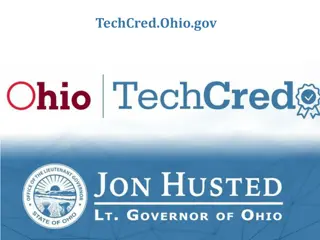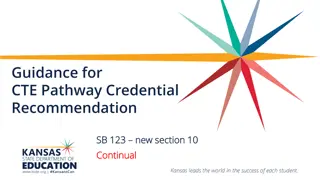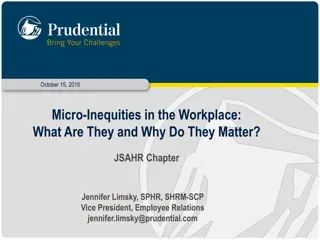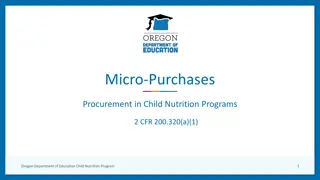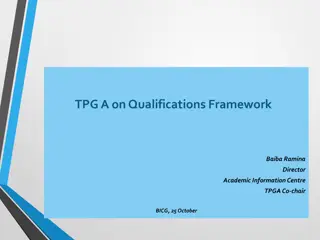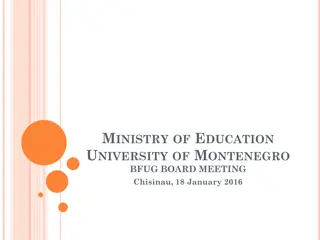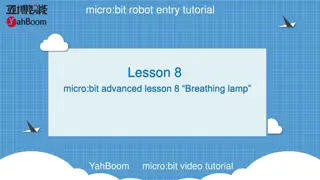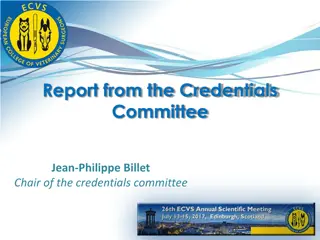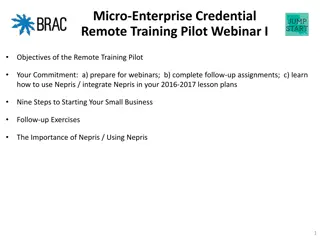Developing Guidelines for Micro Credentials in Higher Education
Qualifications Agency is tasked with providing expertise in developing qualifications, ensuring quality, and connecting the qualifications system of Serbia with the European Qualifications Framework. They assess new initiatives, support sector skills councils, manage qualification standards, and oversee recognition and accreditation processes. Additionally, they monitor the effects of qualifications on employment and lifelong learning, conduct research projects, and maintain the National Qualifications Framework of Serbia.
Uploaded on Mar 15, 2025 | 1 Views
Download Presentation

Please find below an Image/Link to download the presentation.
The content on the website is provided AS IS for your information and personal use only. It may not be sold, licensed, or shared on other websites without obtaining consent from the author.If you encounter any issues during the download, it is possible that the publisher has removed the file from their server.
You are allowed to download the files provided on this website for personal or commercial use, subject to the condition that they are used lawfully. All files are the property of their respective owners.
The content on the website is provided AS IS for your information and personal use only. It may not be sold, licensed, or shared on other websites without obtaining consent from the author.
E N D
Presentation Transcript
Qualifications Agency Developing Guidelines for the implementation of micro credentials in HE, MicroGuide Erasmus Project, Qualifications Agency, 11-12thJuly 2022.
THE FOUNDER Government of the Republic of Serbia ("Official Gazette of RS", No. 27/2018) JURISDICTION Providing expertise and professional support in the process of developing qualifications and ensuring quality in the implementation of the National Qualifications Framework of the Republic of Serbia and connecting the qualificationssystem with the European QualificationsFramework.
Serbian Government Ministry of Education, Science and Technological Development 12 SSC 252 members Management Board Director Director s office Deputy director Centre for qualifications development and support to Sector Skills Councils Centre for Accreditation of providers in Adult Education ENIC/NARIC Centre Office for general and legal affairs Accounting and finance department
Main tasks assessment of initiatives for the introduction of new qualifications; provision of expertise and administrative-technical support to sector skills councils (SSC), and development of proposals for qualification standards; management of the NQFS Register according to the The National Qualifications Classification System (CLASSNQFS), aligned with the International Standard Classification of Education (ISCED 13-F); recognition of foreign school qualifications and professional recognition; accreditation of providers in non-formal AE (PROAEA); external evaluation of PROAEA; monitoring the measures and effects of the implementation of (new) qualifications on employment and lifelong learning; preparation of developmental projects, analysis and research of importance for the development of qualifications.
National qualification framework of RS - NQFS
EMA 2
Main characteristics of NQFS NQFS is the system that regulates qualifications in the Republic of Serbia; It includes the number and description of qualifications, the relationships between qualifications and the paths of mobility and advancement; Qualifications are classified in NQFS into eight (8) levels and four (4) sub- levels; It serves for the development of qualification standards based on the needs of the labour market, the individual and society as a whole; It contributes to the improvement of cooperation between relevant interested parties, i.e. social partners: educational institutions, institutions, employers and trade unions -SSC; NQFS enables improvement of access, transparency, flexibility of paths and permeability in the education system, and recognition/validation of non- formal and informal learning (competencies experience); It ensures comparability and recognition of qualifications obtained in the Republic of Serbia with qualifications obtained in other countries. acquired through work
NQFS-EQF EQF NQFS NQFS contains eight levels corresponding to the levels of the European Qualifications Framework; The structure of the NQFS is also designed in accordance with the EQF and includes descriptors for each (sub)level of qualification, based on the concept of learning outcomes; There is a correlation and compatibility between the language and the concepts descriptions of both framework levels; The NQFS contains specific attributes as a result of national context and legislation, so that statements of knowledge, skills, abilities and attitudes are aligned with the policy of defining learning outcomes, i.e. all are formulated as verbs. 1 1 2 2 3 3 4 4 5 5 6.1 6 6.2 7.1 7 7.2 8 8 REPORT on referencing National Qualifications Framework of the Republic of Serbia to the European Qualifications Framework for Lifelong Learning and Self-certification to the Qualifications Framework of the European Higher Education Area
Specific NQFS attributes Two sublevels at level 6 and 7 as result of national context and stakeholders acceptance of qualifications in new framework The skills descriptions in the NQFS have been extended to other aspects such as 'complexity of problems', 'communication', 'use of equipment Abilities and attitudes - apart from the main determinants (responsibility and autonomy) for description of outcomes per levels, contain other criteria, for example demonstrating entrepreneurialism 3, 4 and 5 are slightly demanding than EQF levels (international experts observation)
NQFS Institutional Framework Institution Ministry of Education, Science and Technological Development (MoESTD) NQFS Council (NQFSC) Key responsibilities Monitoring the implementation of NQF law and coordination of institutions and bodies Adoption of Methodology for development of qualifications standards Adoption of qualification standards Adoption of standards for self-evaluation and external assessment of accredited adult education providers Advising on the quality of the NQFS implementation and referencing to EQF Adoption of qualificationsstandards proposal Recommendation on SSC establishment Monitoring SSC operation Providing professional support to referencing process and implementation of NQFS Providing professional and technical support to NQFS Council and SSC Development of qualification standards proposals Management of the NQFS Register Accreditation of providers in Adult Education Recognition of foreign qualifications Qualifications Agency (QA) Decision making on initiatives for qualification standard development Mapping and identifyingrelevant qualifications within the Sector Identifies qualification that are outdated Proposes list of qualification that are suitable for RPL Sectoral Skills Councils (SSC)
NQFS Legislation framework Standards of services of career guidance and counselling ( Official Gazette RS , no. 43/19) Qualifications framework: qualification levels and descriptors, types of qualifications, qualifications classification system, available form of learning, career guidance and counselling The Law on NQFS The NQFS Register Secondary legislation Bodies and institutions: NQF Council, NQF Agency, Sector Skills Councils, Ministry responsible for education Methodology for development of qualification standards Form and content of Initiative for development of qualification standard Quality assurance: qualification standard processes (Initiative for development, drafting the proposal and adoption of qualification standard) registration of the qualifications, referencing the NQF to EQF; Standards for self-assessment and external evaluation of providers of Adult education Recognition of foreign qualifications Accreditation of providers of (non-formal) Adult Education Procedure and standards for RPL
Types of qualifications NQFS LEVEL NQFS 1 FORM OF TYPE QUALIFICATION TITLE EDUCATION/LEARNING FORMAL PRIMARY EDUCATION (TWO CYCLES, 8 YEARS) GENERAL NQFS 4 FORMAL FORMAL / NON-FORMAL FORMAL / NON-FORMAL GYMNASIUM (4 YEARS) NQFS 2 MANIPULATOR IN FOOD PRODUCTION (2 YEARS) NQFS 3 BAKER (3 YEARS) VOCATIONAL NQFS 4 FORMAL FOOD PROCESSING TECHNICIAN (4 YEARS) FORMAL / NON-FORMAL NQFS 5 BAKER SPECIALIST (1 YEAR) NQFS 6.1 FORMAL AGRICULTURAL ENGINEER (180 ECTS) NQFS 6.2 FORMAL GRADUATED AGRICULTURAL ENGINEER (240 ECTS) ACADEMIC NQFS 7.1 FORMAL MASTER AGRICULTURAL ENGINEER (60 ECTS) NQFS 7.2 FORMAL SPECIALIST AGRICULTURAL ENGINEER (60 ECTS) NQFS S 8 FORMAL PHD BIOTECHNICAL SCIENCES (180 ECTS) NQFS 6.1 FORMAL PROFESSIONAL AGRICULTURAL ENGINEER (180 ECTS) PROFESSIONAL NQFS 6.2 FORMAL PROFESSIONAL SPECIALIST AGRICULTURAL ENGINEER (60 ECTS) NQFS 7.1 FORMAL PROFESSIONAL MASTER AGRICULTURAL ENGINEER (120 ECTS)
Qualification standard elements QUALIFICATION STANDARD Title of the qualification: Code of the qualification RELEVANCE OF QUALIFICATION FOR EMPLOYMENT AND FURTHER LEARNING Permeability within the qualifications system Occupation(s) to which qualification is related Occupational standard[1] Duties and tasks / only if there is no occupational standard BASIC QUALIFICATION CHARACTERISTICS CLASSNQFS / ISCED-F 2013 NQFS LEVEL EQF level Type of the qualification Scope of the qualification (in credits or duration of programme) Preconditions for the acquisition of the qualification Form of learning/education Type of public document LEARNING OUTCOMES General description of the qualification Knowledge Skills Abilities and attitudes Type of assessment of the achievement of learning outcomes QUALIFICATION QUALITY ASSURANCE Qualifications of programme organizers/teachers The body competent for issuing the document QUALIFICATION STANDARD REFERENCE DATA Effective Date Revision date End date [1]Article 50. paragraph 3. of the Law on NQFS stipulates that until the adoption of occupational standards in accordance with the regulations relevant to employment, the link between qualification standards and the labour market will be based on the data on occupations determined in accordance with labour and employment regulations.
Procedure for inclusion of qualification in NQFS Schools, Universities, Faculties, Private providers Employers, Professional associations Government institutions (Ministries, Agencies, Institutes) Bodies (councils) Initiative for developing and adopting the qualifications standard Elaborate justification of qualification and proposal of qualification standard Qualification Agency Assessment of the relevance of the Initiative Sector Skill Council Methodology of qualification standard development Decision making on development of qualification standard Qualification Agency Development of qualification standard Rulebook on NQFS Register Rulebook on CLASSNQFS NQFS Council Adoption of qualification standard MoESTD Qualification Agency Adoption NQFS Register
Recognition of prior learning (VNFIL) o an AE activity which is achieved through the assessment of knowledge, skills, abilities and attitudes acquired through education, life or work experience, which enables further learning and increases competitiveness in the labour market; the term is equated with the term VNFIL, in line with the European guidelines for validating non-formal and informal learning (NQFS Law) o 2014. Concept of RPL o 2019. with the IPA project support Concept is revised and in this moment bylaw on RPL is in implementation o List of qualifications for RPL (levels 2,3 and 5) is proposed by SSC o Competency based assessment will be applied in process of recognition based on qualification standards
Credit System ECTS is based on the principle that the sum of 60 ECTS points corresponds to the overall average student engagement during a 40-hour workweek in an academicyear. o Student workload - about 1500-1800 hours per year - 1 ECTS credit is awarded for about 25-30working hours. o The student workload expressed through ECTS credits implies the time required to complete learning activities: attending classes, seminars, consultations, independent research and learning, project preparation, exams, practical classes, etc. o Transfer of ECTS credits is possible between different study programs, within the same cycle and type of studies, while in international mobility programmes transfer of ECTS credits is possible also between different cycles and types of studies o Implementation of the system ECVET is foreseen in the Strategy, but neither decision nor regulation has been adopted. o
NQFS Register NQFS Register is a public database in which qualifications are classified and which contains relevant information on qualifications. Role of the NQFS Register: o transparent integration of the data on nationally recognized qualifications at all levels; o comparability of learning outcomes achieved at different levels, within different types and different forms of learning; o linking data on qualifications to occupations; o comparability of qualification levels in Serbia with EQF and QF-EHEA levels.
NQFS Register Structure https://noks.azk.gov.rs/en.html Sub-registers Content - data New qualifications Active qualifications: - level NQFS 1 - qualifications on level 2-5 NQFS from 1987. - levels 6.1 to 8 NQFS from Bologna process introduction, 2005. National Qualifications Register has Archive which contains qualifications made before active qualifications, because they are mostlyrepresented in working population Qualification standards Standards of qualifications - defined in line with Qdevelopment Methodology Publicly Recognized Organizers of Adult Education Activities (PROAEA) Accredited PROAEA - approved adult education programs/activities and employers with whom PROAEA realize practical work.
Quality assurance in HE STANDARD PROCESS COMPETENT INSTITUTIONS/ BODIES Qualifications Agency Sector skills council NQFS Council Ministry Development development qualification of Education, Science and Technological adoption National Council for Higher Education (standards) National Entity for Accreditation and Quality Assurance accreditation of programmes and higher education institutions programmes Ministry Development of Education, Science and Technological issuing a work permit student achievements / certification grading Higher education institution final thesis quality of work of the institution National Entity for Accreditation and Quality Assurance external evaluation self-evaluation Higher education institution
Procedures for inclusion of qualifications in the national framework are transparent Qualification standard development QA and SSC Register of Qualifications (QA) Accreditation NEAQA/CAQA Qualification does not exist yet New HE Qualification Register of Qualifications Standards (QA) Register of Qualifications (QA) Accreditation NEAQA/CAQA Active HE Qualification
Thank you for your attention! www.azk.gov.rs https://noks.azk.gov.rs/
